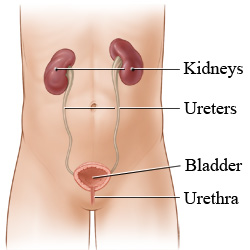Urethritis: Care Instructions
Your Care Instructions

Urethritis is an infection of the tube that takes urine from the bladder to the outside of the body. This
tube is called the urethra.
The infection is often caused by bacteria. This can happen if you have a sexually transmitted infection
(STI). But a virus may also be a cause.
Urethritis is usually treated with antibiotics. Most cases clear up with treatment. Proper treatment is very
important. If you don't treat it, the infection can lead to lasting damage of the urethra. Other parts of the
urinary system can also be damaged.
Follow-up care is a key part of your treatment and safety. Be sure to make and go to all
appointments, and call your doctor if you are having problems. It's also a good idea to know your test results
and keep a list of the medicines you take.
How can you care for yourself at home?
-
If your doctor prescribed antibiotics, take them as directed. Do not stop taking them just because you
feel better. You need to take the full course of antibiotics.
-
Take an over-the-counter pain medicine, such as acetaminophen (Tylenol), ibuprofen (Advil, Motrin), or
naproxen (Aleve), if needed. Be safe with medicines. Read and follow all instructions on the label.
-
Do not take two or more pain medicines at the same time unless the doctor told you to. Many pain medicines
have acetaminophen, which is Tylenol. Too much acetaminophen (Tylenol) can be harmful.
-
Your doctor may have you take phenazopyridine (Pyridium). This is a pain medicine for the urinary tract.
It can turn your urine a deep red-orange. This is normal. Call your doctor if you think you are having a
problem with your medicine.
-
Do not have sex until you are done with treatment. If you do have sex, be sure to use a condom. Your sex
partner or partners should be tested too if your urethritis was caused by an STI.
-
If your infection was caused by an injury or chemicals, avoid those things if you can.
When should you call for help?
 Call your
doctor now or seek immediate medical care if:
Call your
doctor now or seek immediate medical care if:
Watch closely for changes in your health, and be sure to contact your doctor if:
Current as of: November 15, 2023
Content Version: 14.0
Care instructions adapted under license by your
healthcare professional. If you have questions about a medical condition or this instruction, always ask
your healthcare professional. Healthwise, Incorporated disclaims any warranty or liability for your use of
this information.